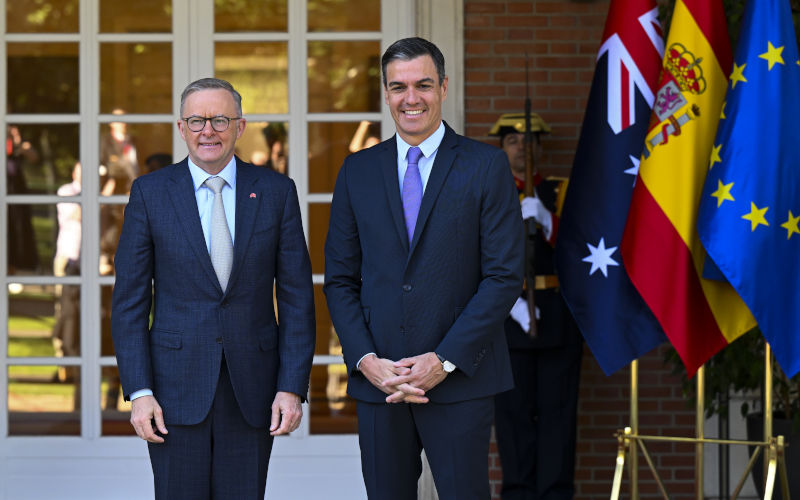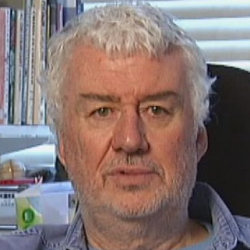Understanding the Australia-NATO chats in Madrid
June 28, 2022
Less than three years ago President Macron said NATO was afflicted with ‘brain death’.
When Prime Minister Anthony Albanese announced that he would be attending the NATO meeting in Madrid on 29 June as a priority and denounced the thuggish, illegal behaviour of Russia in Ukraine the coverage accorded his decision was incomplete, to say the least. Overall, while it included the PMs justification for attending Australia is the largest non-NATO contributor to supporting Ukraines resistance and sovereignty - it ignored Australias developing relationship with NATO over the last several years and it omitted any reference to the embarrassing silences and contradictions attending NATO in general, and the situation in Ukraine more specifically.
It is surely not too much to expect that mention be made of the fact that, perhaps surprisingly, Australia has a formal relationship with NATO given that Article 6 of the Washington Treaty which established it envisaged a scope of operations regionally defined by the north Atlantic, or if exceptional circumstances prevailed, no further south than the Tropic of Cancer.
Australias designation by President George H. W. Bush as a Major Non-NATO ally of the US in 1989 was followed in 2006, by the US Ambassador to NATOs proposal that Australia be included in a Global NATO within a Concert of Democracies such as Brazil, Japan, and South Africa. Four years later, following the adoption of the alliances New Strategic Concept, the Concert of Democracies concept could only be used disingenuously as furtherglobal partners were announced among them Afghanistan, Mongolia, and Pakistan. In the period since, Australias status has been promoted to that of Enhanced Partnership, within which it will have access to NATOs operational planning, and governing councils.
Such a promotion goes beyond the collaboration and coordination required when NATO commands operations to which Australia was a contributor two examples being the International Security Assistance Force in Afghanistan, and the counter-piracy operations off the coast of Somalia. Accordingly, Foreign Minister,Julie Bishops endorsement, at the NATO summit in Cardiff in 2014 that, of future sanctions against Russia to contain its aggression, the opening of an Australian Embassy in Kiev, the provision of supplies to the Ukrainian military, and the possible professional training of a small number of Ukrainian officers to attend the ADF staff colleges in Canberra are measures which embed Australia within already existing states of hostility that have their origins in power politics to which it is otherwise a spectator.
It therefore might be informative of the present to know that, in October and November 2015,Australia participatedin_Trident Junction 15_, the largest NATO exercise in 13 years, involving some 36,000 troops from 30 nations, across Spain, Italy, and Portugal. It did so as one of seven partner nations, and notably, it was the only non-European nation among them.
The purpose at the time? To provide an opportunity for them to refine their operational capabilities. Air, Land, Maritime, and Special Forces will participate simultaneously in several locations and from different Headquarters to train in a complex environment to improve Alliances full spectrum capabilities. At the conclusion of Trident Juncture 2015, the Headquarters Staff responsible for overseeing the exercise was officially certified to lead the NATO Response Force, if activated, throughout 2016. Countering Russia in Ukraine was frequently cited as the immediate context for such an action.
It is important to note that NATO, ever since the dissolution of the Soviet Union, has experienced an existential crisis and desperately seeks relevance, a raison detre, to assuage the anxiety that its membership is in reality too large, and possessed of too many fissures which threaten its declared liberal-democratic values. Think Hungary, Poland, and Turkey.
To some commentators the forthcoming NATO summit will, nevertheless, be the occasion towards reinvigorating an organization that, in Frances President Macron accurate diagnosis less than three years ago, was afflicted with brain death. The more charitable among them who refuse to forget its founding principles are disposed to see this development as a paradox: NATOs sense of unity and cohesion and its re-commitment to deterring a revisionist power, Russia, from re-ordering the geopolitical configuration of Europe is the result of it having failed in its own terms. Worse, Russias invasion of Ukraine is at least significantly the consequence of NATOs disregard for the very principles on which it stands: power politics.
Paradox, however, is a fluid concept and frequently disguises, where it does not actually entail, an unadorned conclusion of hypocrisy. What the PM will be attending in Madrid will be a gathering of those united in condemning, loudly and at length, the politics of the latest Russian atrocity while remaining personae mutae regarding any audit of the events which led to their consensus.
The preference will be to religiously invoke the blessed and mysterious strategic trinity alliance, balance of power, deterrence as though their very mention bestowed immutable troths and nobility of purpose on the conversations (which they dont) so as to avoid any exposition of their frailties which might lead in the direction of Copernican discoveries. (which they will).
Consider this brief schedule of five impolite, and thus foregone topics of conversation in Madrid:
-
The fact that the US had a three-point strategy for Ukraine which was bound to raise existential security concerns in Russia: expanding NATO to include Ukraine; expanding the EU to accommodate Ukraine; and transforming Ukraine into a pro-US ally with the appurtenances of liberal democracy.
-
The declared motive driving the unconscionable lack of a strategy to end the war in Ukraine is Washingtons objective to over-extend and weaken Russia no matter the death and destruction wrought in the process which is likely to be lengthy and thus incubate the pressures for a wider war.
-
The costs of this default not constitute a constellation of disasters growing inflation, global economic recession, hunger and food shortages, and millions being rendered refugees or internally displaced, but consequences which NATO is incapable of addressing despite its demonstrated complicity in their causes.
-
The role played by the repeated and mendacious denials by the US that Russias invasion of Ukraine might have been prevented if Washington had acknowledged the validity of practising a spheres of interest accommodation in Easter Europe such as those which allowed the Cold War to be managed and which, notably, the US has insisted on with regard to Latin America and the Caribbean since the enunciation of the Monroe Doctrine in 1823.
-
The deep pathologies of US global strategy exist in parallel to the daily demonstrations of the equally deep pathologies in American economic, political, and social life to such an extent that its position as the unipolar leader in matters of national security is simply not credible.
And this is but to sketch the almost farcical nature of the Madrid meeting. A more comprehensive account would include the robust research on alliances derived from the massive historical databases such as the Correlates of War, the findings of which reproach the conventional pro-alliance wisdom that alliances and balances of power stave off war. Indeed, the findings that indicate the exact opposite.
Summarising the research based on four major research undertakings including the Correlates of War project basically, a database of international (interstate, imperial and colonial) and civil wars involving one or more sovereign states, anywhere in the world, and in the period since the Congress of Vienna (1814-15) - the findings shred the veil of confidence in such arrangements.
Specifically, the analyses and conclusions mandate not that those against alliances justify their respective positions, but that those who advocate them justify their own. Indeed, what is on offer is an implosion of the conventional dogma in the following terms:
It is now clear that alliances do not produce peace but lead to war. Alliance making is an indicator that there is a danger of war in the near future. … This means that the attempt to balance power is itself part of the very behaviour that leads to war. This conclusion supports the earlier claim that power politics is an image of the world that encourages behaviour that helps bring about war. . . It is now known that alliances, no matter what their form, do not bring about peace …
Werner Heisenberg, though reflecting upon science, is relevant to the current, sacred discourse on alliances. He warning was that man finds himself in the position of a captain whose ship has been so securely built of iron and steel that the needle of his compass no longer points to the north, but only towards the ships mass of iron, a condition which another scientist, Erwin Schrodinger, likened to atrophism and ossification, which produced joyfully isolated groups of experts engaging in virulently esoteric chat.
Michael McKinley is a member of the Emeritus Faculty, the Australian National University; he taught Strategy, Diplomacy and International Conflict at the University of Western Australia and the ANU

